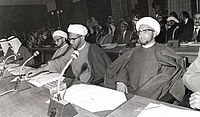
Politics of Bahrain takes place since 2002 in a framework of a constitutional monarchy where the government is appointed by the King of Bahrain, King Hamad bin Isa Al Khalifa. The head of the government since 1971 is Prime Minister Prince Khalifa bin Salman Al Khalifa and the Crown Prince is Prince Salman bin Hamad Al Khalifa, who serves as Commander of the Bahrain Defence Force. The parliament is a bi-cameral legislature, with the Chamber of Deputies elected by universal suffrage, and the Shura Council appointed directly by the king. MP Khalifa Al Dhahrani is the Speaker of Parliament.

The National Assembly, is the unicameral legislature of Kuwait. The National Assembly meets in Kuwait City. Members are chosen through direct election; the country is divided into five electoral districts with ten members representing each district. There are no official political parties in Kuwait, therefore candidates run as independents during elections; upon winning, members usually form informal parliamentary blocs. The National Assembly is made up of 50 elected members as well as up to 15 appointed government ministers who are ex officio members. On October 16, 2016, the Amir of Kuwait issued a decree dissolving the National Assembly citing security challenges, paving the way for early elections, which were held on November 26, 2016.

The National Assembly is bicameral with the lower house, the Chamber of Deputies, having 40 members elected in single-seat constituencies for a four-year term. The upper house, the Shura Council, has 40 members appointed by the King of Bahrain, with the stated aim of giving a voice to minority communities and technocratic experts within the legislative process. Supporters of the system refer to long established democracies the United Kingdom and Canada operating with this bicameralism with an appointed upper chamber and an elected lower chamber. Opponents of this system point out that unlike the bicameral systems in the UK and Canada, the Bahraini system gives the unelected upper house equal or more legislative power than the elected lower house, allowing the King to control all legislation. Opponents also point out that the current system was imposed unilaterally by the King, violating the 1973 Constitution and a 2001 signed agreement with the Bahraini opposition.

Elections in Botswana take place within the framework of a multi-party democracy and a parliamentary system. The National Assembly is mostly directly elected, and in turn elects the President and some of its own members. The Ntlo ya Dikgosi is a mixture of appointed, hereditary and indirectly elected members.

Elections in Guyana take place within the framework of a multi-party representative democracy and a presidential system. The National Assembly is directly elected, with the nominee of the party or alliance that receives the most votes becoming President.

Elections in Kuwait are held for both the National Assembly and for the Municipality. Kuwait's constitution calls for elections to the unicameral National Assembly at a maximum interval of four years. Elections are held earlier if the Constitutional Court or Emir dissolve the parliament.

Elections in Rwanda take place within the framework of a multi-party democracy and a presidential system. The President and majority of members of the Chamber of Deputies are directly elected, whilst the Senate is indirectly elected and partly appointed.

Al-Wefaq National Islamic Society, or Al-Wefaq for short, is a Bahraini political party. Although from 2006 to 2011 it was by far the single largest party in the Bahraini legislature, with 18 representatives in the 40-member Bahraini parliament, it was often outvoted by coalition blocs of opposition Sunni parties and independent MPs reflecting gerrymandering of electoral districts. On 27 February 2011, the 18 Al-Wefaq members of parliament submitted letters of resignation to protest regime violence against pro-reform Bahraini protestors.

The Islamic Action Society, also referred to as Amal Party, is one of the main Islamist political parties in Bahrain, and mainly appeals to Shīʻa followers of the Islamic philosopher Mohammad Hussaini Shirazi (1928-2001), who are known as "the Shirāzī faction".
Following Bahrain's independence from the British in 1971, the government of Bahrain embarked on an extended period of political suppression under a 1974 State Security Law shortly after the adoption of the country's first formal Constitution in 1973. Overwhelming objections to state authority resulted in the forced dissolution of the National Assembly by Amir Isa bin Salman Al Khalifa and the suspension of the Constitution until 2001. The State Security Law of 1974 was a law used by the government of Bahrain to crush political unrest from 1974 until 2001. It was during this period that the worst human rights violations and torture were said to have taken place. The State Security Law contained measures permitting the government to arrest and imprison individuals without trial for a period of up to three years for crimes relating to state security. A subsequent Decree to the 1974 Act invoked the establishment of State Security Courts, adding to the conditions conducive to the practice of arbitrary arrest and torture. The deteriorating human rights situation in Bahrain is reported to have reached its height in the mid-1990s when thousands of men, women and children were illegally detained, reports of torture and ill-treatment of detainees were documented, and trials fell short of international standards.
The 1990s uprising in Bahrain also known as the uprising of dignity was an uprising in Bahrain between 1994 and 1999 in which leftists, liberals and Islamists joined forces to demand democratic reforms. The uprising caused approximately forty deaths and ended after Hamad ibn Isa Al Khalifa became the Emir of Bahrain in 1999 and a referendum on 14–15 February 2001 massively supported the National Action Charter. The uprising resulted in the deaths of around 40 civilians and at least one Bahraini soldier.

The State of Bahrain was the name of Bahrain between 1971 and 2002. On 15 August 1971, Bahrain declared independence and signed a new treaty of friendship with the United Kingdom. Bahrain joined the United Nations and the Arab League later in the year. The oil boom of the 1970s benefited Bahrain greatly, although the subsequent downturn hurt the economy. The country had already begun diversification of its economy and benefited further from Lebanese Civil War in the 1970s and 1980s, when Bahrain replaced Beirut as the Middle East's financial hub after Lebanon's large banking sector was driven out of the country by the war.

General elections were held in Bahrain on 25 November 2006 for the 40-seat Council of Representatives alongside municipal elections. There was a 72% turnout in the first round of polling. As expected by most observers, Shi'a and Sunni Islamists dominated the poll, winning a clean sweep in the first round of voting, while liberal and ex-communist MPs lost all their seats. Four candidates of the left-wing National Democratic Action made it through to second round run-off which was held on 2 December 2006.

Constituent Assembly elections were held in Bahrain on 1 December 1972. All candidates ran as independents. A total of 15,385 votes were cast, giving a turnout of 88.5%. However, only 12.5% of the population were registered voters at the time.
General elections were held in Lebanon between 24 March and 7 April 1968. Independent candidates won the majority of seats, although many of them were considered to be members of various blocs. Voter turnout was 49.6%.

Ayatollah Sheikh Isa Ahmed Qassim is Bahrain's leading Shia cleric and a politician. He is the spiritual leader of Al Wefaq, Bahrain's biggest opposition society. He was the leader and is the founders of Islamic Enlightenment institution.

Early general elections were held in Kuwait on 27 July 2013. The elections were required after the Constitutional Court dissolved Parliament and annulled the results of the December 2012 elections. Voter turnout was an estimated 52.5%, which was higher than expected despite an opposition boycott, and only 7% lower than the non-boycotted February 2012 elections.

General elections were held in Bahrain on 22 November 2014, with a second round on 29 November in constituencies where no candidate received at least 50% of the vote. The elections were boycotted by the Shiite Islamist opposition. The government announced the voter turnout as 52.6%, although the opposition claimed it was only 30%.














